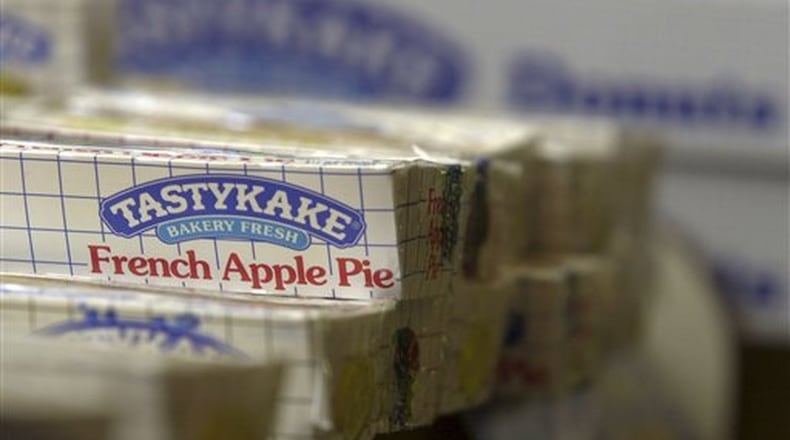Flowers Foods at a glance
HQ: Thomasville
Founded: 1919
Bakeries: 49
U.S. distribution: 36 states and District of Columbia
2015 financial result: $197 million profit on $3.8 billion in sales
Brands include: Nature's Own, Wonder, Whitewheat, Cobblestone Bread Co., Tastykake, Dave's Killer Bread, Barowsky's Organic.
Flowers Foods, the south Georgia mega-baker of Tastykake and Wonder Bread, is the target of nearly two dozen lawsuits, including one filed in Atlanta, claiming illegal hiring practices that prevent truck drivers from earning tens of millions of dollars in overtime pay.
The lawsuits, with over 200 plaintiffs, say Flowers “misclassifies” drivers who deliver its breads, snacks and tortillas to stores, cafeterias and restaurants. Flowers labels them “independent contractors” who own their business and control their territory.
Drivers, though, contend Flowers sets prices, delivery schedules, ad campaigns and virtually every aspect of the retail and wholesale business — a relationship more akin to an employer controlling an employee. They want to be paid like employees with health care benefits and time-and-a-half OT pay, in keeping with federal labor law.
Flowers, based in Thomasville, says the suits are without merit.
The U.S. Department of Labor last week told Flowers it is investigating the bakery over violations of the Fair Labor Standards Act which sets minimum wage, overtime and other employment standards.
The Georgia lawsuit, filed by a Douglasville driver, is yet another in a long line of cases, boosted by Obama administration rulings, challenging Corporate America’s employment practices. They reflect the increasingly fraying ties between management and labor, particularly on job security and retirement benefits, since the Great Recession.
The Labor Department estimates 30 percent of all employers misclassify workers.
FedEx Corp., for example, agreed to a $228 million settlement last year with thousands of California drivers after a U.S. Circuit Court ruled they had been misclassified. Uber and Lyft face similar claims.
Georgia is in the midst of the misclassification fray. Construction workers in Atlanta, truck drivers at the port of Savannah, and film industry workers statewide have all claimed that employers cheated them of wages.
Not all cases involve big companies. A Chinese restaurant owner in Jonesboro was ordered by the Labor Department two years ago to pay $2 million in back wages to 84 waiters and kitchen staffers. A Marietta printer paid $32,000 to 69 misclassified workers. And an Atlanta judge awarded 73 strippers at The Onyx in Atlanta a total of $1.6 million in back pay.
Cost to taxpayers
Misclassification costs taxpayers as well as workers. Businesses that wrongfully hire independent contractors typically don’t cover worker’s compensation, payroll taxes or unemployment insurance. The Government Accountability Office reported a decade ago that misclassification cost the federal treasury $2.7 billion alone in unpaid taxes. The tally is certainly much higher today.
“I suspect this is going on on a pretty widespread basis,” said state Sen. Josh McKoon, R-Columbus, who held legislative hearings on misclassification last year.
“We had truck drivers tell us, ‘Look I’m one illnes away from being unemployed and unable to feed my family. I can’t afford to be sick and take time off.’ (And), what’s happening is that these businesses that don’t properly classify their employees are being subsidized by the state of Georgia.”
In the Flowers case, Rudolph Wordlaw of Douglasville sued the company and its Villa Rica warehouse subsidiary last December claiming he regularly worked 50-55 hours a week yet never received OT pay.
Wordlaw did not return calls seeking comment on the case.
His lawsuit says Flowers — the nation’s second largest packaged bread company with $3.7 billion in sales — controls just about every major aspect of the company-distributor-customer relationship.
An independent contractor, Worldlaw and dozens of other plaintiffs claim, would have much more say over distribution, sale and marketing of Nature’s Own, Sunbeam and Merita breads. Flowers, the lawsuits say, negotiates products, prices, displays and promotional campaigns directly with retailers.
“Distributors are dependent upon, and controlled by, the defendants and are not in business for themselves,” Wordlaw’s lawsuit contends. “The result is that distributors’ job duties and ability to earn income is tied directly to the sale and promotion of products outside of their control.”
Independent drivers
Flowers, with 1,850 employees in Georgia and another 531 distributors, has relied upon independent drivers to distribute goods since the 1980s. A distributor buys a delivery route, sometimes with help from corporate financing, and is given exclusive rights to deliver breads and snacks within a certain territory.
“The independent distributor model … is a proven, market-driven approach to the operation of our direct-store-delivery segment,” the company said in a statement. “We believe that it results in significant benefits for independent distributors, their customers and Flowers.”
The company said, “We do not believe the Georgia lawsuit or the others being brought against the company have merit, and we intend to vigorously defend our position.”
The degree of control will be key in determining if Wordlaw and other plaintiffs are deemed independent contractors or employees, labor experts predict. A year ago the Labor Department updated its misclassification guidelines saying employers “should be wary of classifying as independent contractors merely because workers control some aspects of their job.”
Catherine Ruckelshaus, an attorney with the left-leaning National Employment Law Project in New York, said the drivers appear to have the upper legal hand in their fight against Flowers.
“When you’re an independent contractor you’re supposed to be running your own business,” she said. “But these drivers are not able to pass along costs if the price of gas goes up. They can’t change what’s being charged to the customers. So it doesn’t feel like a real separate business.”
About the Author
Keep Reading
The Latest
Featured


